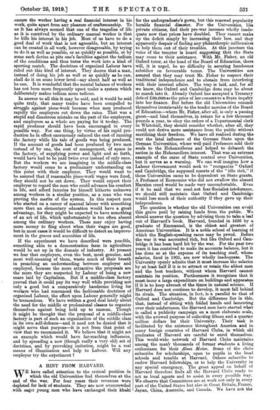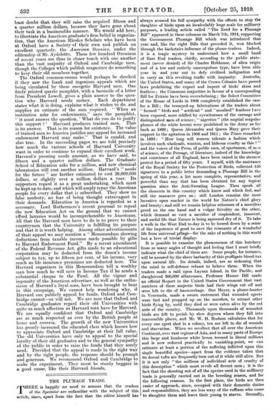A HINT FROM HARVARD.
UTE have called attention to the critical position in VI which the old Universities find themselves at the end of the war. For four years their revenues were depleted for lack of students. They are now overcrowded with eager young men who have exchanged their khaki 'for the undergraduate's gown, but this renewed popularity heralds financial disaster. For the Universities, like private citizens, find their pre-war incomes wholly inadequate now that prices have doubled. They cannot make up the deficit simply by increasing their fees, and they apparently despair of finding any philanthropic millionaires to help them out of their troubles. At this juncture the voice of the tempter is heard suggesting that the State may come to their assistance. With Mr. Fisher, an old Oxford tutor, at the head of the Board of Education, there will, it is urged, be no difficulty in securing handsome subsidies on favourable terms. The Universities are assured that they may trust Mr. Fisher to respect their traditional independence and to abstain from interfering with their internal affairs. The trap is laid, and, for all we know, the Oxford and Cambridge dons may be about to march into it. Already Oxford has accepted a Treasury dole of £30,000 as the price of her consent to a State inquiry into her finance. But before the old Universities comma themselves irretrievably to the tender mercies of the Board of Education—where Mr. Fisher, after -all, is only a passing guest—and bind themselves, in return for a few thousand pounds a year, to obey the orders of a Departmental clerk in Whitehall, they should consider whether, after all, they could not derive more assistance from the public without sainificing their freedom. We have all realized during the war the fatal influence of the German State upon the German Universities, whose well-paid Professors sold their souls to the Hohenzollerns and helped to debauch the nation in the Hohenzollern interest. That was an extreme example of the curse of State control over Universities, but it serves as a warning. We can well imagine how a Labour Government would seek to " reorganize " Oxford and Cambridge, the supposed resorts of the " idle rich," if those 'Universities came to be dependent on State grants. A Professor of Economics who did not swallow the absurd Mandan creed would be made very uncomfortable. Even if it be said that we need not fear f3ocialist intolerance, we should still maintain that Oxford and Cambridge would lose much of their authority if 'they gave up their independence. The question is whether the old Universities can avoid this grave peril by raising funds from the public. We should answer the question by advising them to take a leaf out of Harvard's book. Harvard, founded in 1636 by a graduate of Emmanuel, is the oldest and greatest of American Universities. It 'is a noble school of learning of which the English-speaking races may be proud. Before the war it was accounted 'rich, but like Oxford and Cambridge it has been hard hit 'by the war. For 'the past 'two years it has contrived to make its accounts balance, but it has done so at the expense of its teaching staff, whose salaries, fixed in 1905, are now wholly inadequate. The University openly admits that it must increase the salaries by at least half if it is to attract or retain the ablest men and the best teachers, without whom Harvard cannot maintain its position. Furthermore it ,recognizes that it mustincur a large expenditure on buildings and apparatus if it is to keep abreast of the times in natural science. If Harvard does not continue to develop, it must fall behind its rivals. The situation,in fact, is' a parallel to that of Oxford and • Cambridge. But the difference lies in this, that, instead of sitting with folded hands and lamenting over their the Harvard men.have started what is ealled a publicity campaign on a most elaborate scale, with the avowed purpose of collecting fifteen and.a quarter million dollars for their University. Their task is facilitated by 'the existence throughout America and in many foreign countries of Harvard Clubs, in which old graduates of Harvard are careful to enrol themselves. This world-wide network of Harvard Clubs maintains among the many 'thousands of former skudents a living enthusiasm for their Alma Mater. Some of the clubs subscribe for scholarships, open to pupils in the local schools and tenable at Harvard. Others subscribe to endow Harvard fellowships, or to help the University in any special emergency. The great appeal on behalf of Harvard therefore finds all the Harvard Clubs ready to act as local agents and to assist in every possible way. We observe that Committees are at work not only in every part of the United States but also in Great Britain, France, Japan, China, Australia, and Canada. We have not the least doubt that they will raise the required fifteen and a quarter million dollars, because they have gone about their task in a businesslike manner. We would add here, to illustrate the American graduate's firm belief in organization, that the American Rhodes Scholars who have been at Oxford. have a Society of their own and publish an excellent quarterly, the American Oxonian, under the editorship of Mr. Aydelotte. These few hundred. Oxonians of recent years are thus in closer touch with one another than the vast majority of Oxford, and Cambridge men, though the Colleges which publish magazines do something to keep their old members together. The Oxford common-rooms would perhaps be shocked if they saw the frank and ingenious appeals which are being circulated by these energetic Harvard men. One finely printed. quarto pamphlet, with a facsimile of a letter from President Lowell, gives a plain answer to the question why Harvard needs money. Each department states what it is doing, explains what it wishes to do, and supplies an estimate of the sum required. " When an institution asks for endowments," says the pamphlet, " it must answer the question, ' What do you do to justify this support ? ' Harvard produces trained men. That is its answer. That is its reason for existence. The value of trained. men to America justifies any appeal for increased endowment Harvard may make." That is candid, and also true. In the succeeding pages we are told precisely how much the various schools of Harvard University want in order to continue to expand their excellent work. Harvard's pressing needs amount, as we have said, to fifteen and a quarter million dollars. The Graduate School of Education asks for a million, and new chemical laboratories will cost another million. Harvard's " needs for the future " are further estimated to cost 26,809,000 dollars, or slightly over a million dollars a year. Its supporters regard. it as a great undertaking, which must be kept up to date, and which will amply repay the American people for every dollar that is subscribed. They show no false modesty, no fear of being thought extravagant in their demands. Education in America is regarded as a necessary. Lord Rothermere's recent proposal to repeal the new Education Act on the ground that we cannot afford luxuries would be incomprehensible to Americans. All that the Harvard men have to do is to prove to their countrymen that the University is fulfilling its purpose and that it is worth helping. Among other advertisements of their appeal we may mention a Memorandum showing deductions from taxable incomes made possible by gifts to Harvard Endowment Fund." By a recent amendment of the Federal Revenue Act, gifts made to an educational corporation may be deducted from the donor's income subject to tax, up to fifteen per cent. of his income, very much as life insurance premiums are deducted here. The Harvard. organizers in this Memorandum tell a wealthy man how much he will save in Income Tax if he sends a substantial cheque to the Fund. All the vigour and ingenuity of the American advertiser, as well as the enthusiasm of Harvard's loyal sons, have been brought to bear in this campaign. We cannot help wondering why, if Harvard can publicly appeal for funds, Oxford. and Cambridge cannot—or will not. We are sure that Oxford and Cambridge graduates regard their old Universities with quite as much affection as Harvard men have for Harvard. We are equally confident that Oxford and Cambridge are as much respected as ever by the British people at home and oversea. The growth of the new Universities has greatly increased the educated class which knows how to appreciate Oxford and Cambridge at their full value. The old Universities have only to appeal to the special loyalty of their old graduates and to the general sympathy of the public in order to raise the funds that they sorely need. Provided that the appeal is made In the right way and by the right people, the response should be prompt and generous. We recommend Oxford and Cambridge to make the experiment. They must be sturdy beggars in a good cause, like their Harvard friends.











































 Previous page
Previous page